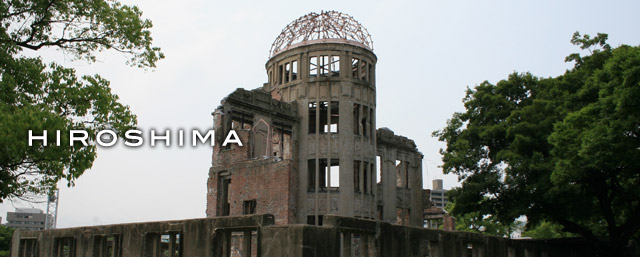
On August 6, 1945 the Atomic Bomb was dropped on Hiroshima.
"Mr. Tanimoto (pastor of the Hiroshima Methodist Church, who was in the suburbs of Hiroshima, two miles from the center of the blast), fearful for his family and church,... ran towards them at the shortest route.... He was the only person making his way into the city; he met hundreds and hundreds who were fleeing, and every one of them seemed to be hurt in some way. The eyebrows of some were burned off and skin hung from their faces and hands... On some undressed bodies, the burns had made patterns - of undershirt straps and suspenders and, on the skin of some women [since white repelled the heat from the bomb and dark clothes absorbed it and conducted it to the skin), the shapes of flowers they had on their kimonos....
"Mr. Tanimoto found about twenty men and women on the sandspit.... They did not move and he realized that they were too weak to lift themselves. He reached down and took a woman by the hands, but her skin slipped off in huge, glove-like pieces. He was so sickened by this that he had to sit down for a moment. Then he got out into the water and, though a small man, lifted several of the men and women, who were naked, into his boat. Their backs and breasts were clammy, and he remembered uneasily what the great burns he had seen during the day had been like: yellow at first, then red and swollen, with the skin sloughed off, and finally, in the evening suppurated and smelly. . . . On the other side (of the river), at a higher spit, he lifted the slimy bodies out and carried them up the slope away from the tide. He had to keep consciously reminding himself that "these are human beings."
Outside the gate of the park, Father Kleinsorge found a faucet that still worked --part of the plumbing of a vanished house -- and he filled his vessels and returned. On his way back with the water, he got lost on a detour around a fallen tree, and as he looked on his way through the woods, he heard a voice ask from the underbrush, "Have you anything to drink?" He saw a uniform. Thinking there was just one soldier, he approached with the water. When he had penetrated the bushes, he saw there were about twenty men, and they were all in exactly the same nightmarish state: their faces were wholly burned, their eyesockets were hollow, the fluid from their melted eyes had run down their cheeks. (They must have had their faces upturned when the bomb went off; perhaps they were anti-aircraft personnel.) One of them said," I can't see anything."
-John Hersey, Hiroshima
Note: The Anti-Nuclear War Heads are dedicated to these anonymous soldiers. Long forgotten, they died as victims of war but acted as sentinels for us all. The Anti-Nuclear War Heads are "Watching the Skies" to remember their vigilance and to honor them as human beings. - the Artists.